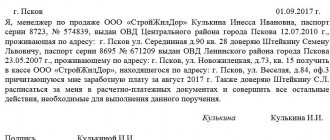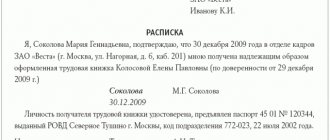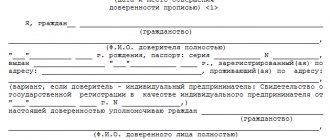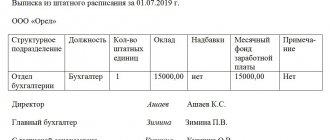Home / Eviction / Let’s find out whether it is possible to evict a person by power of attorney without his presence?
The need to discharge a person from an apartment arises for various reasons and sometimes at a time when his personal presence at the migration service is impossible. The legislation provides for such cases and allows deregistration without a personal visit to the Federal Migration Service (FMS) by the person being deregistered. Some rules and conditions of the procedure must be followed.
General grounds for eviction from an apartment
Employees of the territorial bodies of the Federal Migration Service require the personal presence of the person being discharged. The reason is the established procedure, in accordance with which it is necessary (including) to ensure that a person is deprived of the right to reside voluntarily. There are widespread schemes by criminals through which citizens are deprived of their housing rights without knowing it. Precautionary measures taken by the FMS are aimed, among other things, at preventing such crimes.
However, an extract may be needed at the most inopportune moment, when the person is far away (abroad, in another region of the country), and his appearance in the coming months (and years) is not expected. Reasons for deregistration may be :
- Transactions on alienation of residential real estate;
- Moving to a new place of residence;
- Stay in another region for more than 90 days;
- Forced eviction.
Housing alienation transactions include:
- Sale;
- Donation;
- Inheritance;
- Deprivatization.
When buying and selling, it is recommended to deregister all persons registered in the apartment (house, hostel). Otherwise, the market value of housing decreases. In the case of a gift or inheritance, the former owner may not be involved in registering all persons, but this will become a problem for the new owner.
The deprivatization procedure stipulates that all persons who were registered in housing must be discharged. After the property is transferred to municipal ownership, they can again join it, but as tenants.
Staying outside your place of registration for more than 90 days will result in administrative liability. The fine is imposed both on the culprit and on the persons (individuals and legal entities) who provided him with housing.
A long stay in another region requires temporary or permanent registration. To register in a particular living space, you need to check out of the previous one.
Deregistration without personal presence
Art. 6 of the Law of the Russian Federation of June 25, 1993 No. 5242-I and do not contain requirements for the mandatory presence of a citizen when submitting documents for registration or deregistration. An appeal by a representative is possible on the basis of a notarized power of attorney, as follows from Art. 185 (Civil Code of the Russian Federation).
To the question of whether it is possible to discharge a person from an apartment without his presence by proxy, there is no clear negative answer in the legislation. Registration is only of a notification nature, and passport offices use it to record the will of a citizen when choosing a place of residence.
Registration records cannot be of a permissive nature and somehow limit the rights of a citizen.
But even if there are these justifications, the possibility of deregistering a tenant using a notarized power of attorney is controversial, and the norms of the Laws of the Russian Federation have different interpretations.
Some divisions of the Main Directorate for Migration of the Ministry of Internal Affairs of the Russian Federation proceed from the fact that the right to choose a place of residence belongs to a person from birth, and, in accordance with Part 2 of Art. 17 and art. 150 of the Civil Code of the Russian Federation, is inalienable. It is subject to legal regulation, taking into account the fact that transfer of trust may lead to a violation of the rights and freedoms of others.
Thus, when faced with the need to deregister a person and register him by power of attorney, you should check with your passport office about the possibility of performing this action.
Is it possible to write out without being present?
If a person agrees to eviction, this can be done without his direct participation. In other cases, we are talking about forced deregistration, usually through the court .
Deregistration is permitted forcibly without permission or notification of the person, if such a procedure is provided for by the concluded agreement on the basis of which the settlement in the apartment, house or hostel was carried out.
Some points of forced deregistration:
- Does not apply to owners and close relatives.
- Children under 18 years of age are deregistered only by their legal representatives.
Even in these cases there are exceptions. For example, the owner may be forcibly deregistered if he goes through insolvency proceedings. But more often than not, he himself is interested in completing the bankruptcy process; sabotaging this procedure with his reluctance to discharge will result in financial losses for him.
In other cases, when deregistration is required and the person’s personal presence is impossible, this is done by proxy. A document drawn up in accordance with all the requirements allows you to complete the procedure without a designated person.
Let's learn about the rules for issuing a notice of eviction from an apartment by reading a special article prepared by the editors of our website.
How to do it: algorithm
The whole process looks like this:
- A power of attorney is issued.
- All necessary documents are collected.
- If there are several apartment owners, their consent is obtained.
- The address and schedule of reception of persons at the Federal Migration Service at the location of the housing from which the citizen is being discharged is specified.
- Visit the passport office, submit an application and accompanying documents.
The procedure ends with putting the appropriate mark in the passport. Usually there are no difficulties.
Incorrect behavior, suspicious appearance and behavior - all this can alert the passport officer. The result is that it will require the personal presence of the person being written out.
Therefore, it is recommended to play it safe, limit your consumption of alcoholic beverages, and behave decently. Ignoring this advice can lead to trouble, loss of time and money.
Other options
It is not at all necessary to register in advance; the law does not require this. The following option is possible :
- Arrive at a new place.
- Decide on housing, obtain permission to register in it.
- Contact the local territorial body of the Federal Migration Service with an application for registration.
Based on the person’s application, the passport officer registers him at the new place of registration and automatically cancels the previous registration. Technically, a citizen is discharged without his presence.
Another option is through the official website of the State Services . The algorithm is as follows:
- Register and identify yourself using your phone number and email address.
- Take digital photographs of your passport, identification code, SNILS, military ID, driver's license.
- Upload these pictures for verification.
- Prepare the documents that will be described below.
- After verification, select a registration service at your place of residence.
- Upload the prepared documents and send them.
- A message will be sent to the address specified during registration, which will confirm the receipt of documents, indicate the date of admission to the FMS and the address of its territorial body where you need to appear.
This method is identical to the previous options. The difference is that there is no need to wait in lines when visiting the passport office.
Step-by-step instructions: how to issue a power of attorney?
A power of attorney for eviction from an apartment can be issued in written or printed form; there are no restrictions here.
What points should be reflected?
- Name of the document: “Power of Attorney for discharge from the apartment”;
- full name of the locality;
- date;
- Full name, date and place of birth, citizenship, passport details, registration address;
- Full name of the authorized person, date and place of birth, citizenship, passport details, registration address;
- address of the apartment from which you need to check out;
- validity period of the power of attorney;
- signature of the authorized representative;
- signature, transcript of the principal;
- seal.
For a clearer explanation, here is an example of a document:
POWER OF ATTORNEY Russian Federation, Bryansk, June fifth two thousand and sixteen
I, citizen Kirilova Kristina Oleksandrovna, born November 31, 1989, place of birth: Bryansk, Volodarsky district, citizenship: Russian Federation, gender: female, passport 67 03 567975, issued by the Department of Internal Affairs of the Sovetsky District of Bryansk on February 3, 2001 , registered at the place of residence at the address: Bryansk, Lermontov street 5A (five), apartment 25 (twenty-five), with this power of attorney I authorize citizen Nikolay Valerievich Kirilov, born February 12, 1983: Bryansk city, Volodarsky district, citizenship: Russian Federation, gender: male, passport 67 05 567435, issued by the Department of Internal Affairs of the Sovetsky District of Bryansk on June 25, 1999, registered at the place of residence of Bryansk, Lermontov street 5A (five), apt. 25 (twenty-five), to be my representative in all institutions and organizations of the Russian Federation, regardless of their organizational and legal form, regarding the deregistration of me and the preparation of other documentation from the apartment, which is located at the address: Bryansk, Volodarsky district, Lermontov street 5A (five), apt. 25 (twenty five). Why do I authorize gr. Nikolai Valerievich Kirilov to receive all necessary certificates and documents, submit applications on my behalf, certify copies, make changes and additions to documents, pay necessary expenses on my behalf and at my expense, sign for me and perform all actions related to the implementation of this order .
The power of attorney was issued for a period of five years with the right of substitution. I certify the signature of Nikolai Valerievich Kirilov __________.
29.07.2017 _____________________/______________________/
Who draws up and certifies the paper?
A notary is responsible for issuing a power of attorney. The paper is also certified by a notary.
Reference! Registration of the document is not required.
Validity periods
You can set the expiration date yourself.
It could be a month, a year, five years: whatever you wish.
If this information is not specified, then by default it will be valid for a year.
If you have free time to do this business, then the validity period may not be very long.
If you are busy, it is better to make the deadline longer, since it is unknown how long this procedure will take.
State duty and cost
Based on the Tax Code (Article 333.24), the amount of state duty when drawing up a power of attorney is 200 rubles. The cost of a power of attorney depends on many factors, namely the region, the specific notary, etc. On average, a document will cost 2,500 rubles.
Required documents
The main document is a power of attorney . It is drawn up by a notary; without fulfilling this requirement, it is considered invalid. In addition to this, the following are submitted to the passport office:
- Passports of the person submitting the application and the principal.
- Copies of title documents for real estate, if the application is submitted by the owner.
- Written consent for the release of the remaining owners (not users!) of the property.
The principal's passport is required in the original. This is where the discharge marks will be placed. Legal documents include :
- Deed of gift;
- Contract of sale;
- Will.
If the apartment is state-owned, a social tenancy agreement must be submitted. Additionally, you will need SNILS and identification code.
General power of attorney
When issuing permission to represent the interests of a person upon deregistration, the document must provide instructions for precisely this action. If a general power of attorney is issued, then the person who receives this document can dispose of the apartment at his own discretion :
- Register other persons;
- Register the property in your name;
- Conclude a transaction for its alienation to third parties.
This is taken advantage of by unscrupulous “relatives” and scammers who act under the guise of lawyers helping citizens in matters of registering real estate and residents. There are different pretexts for obtaining a general power of attorney: why draw up documents several times, other actions will be needed, where additional powers of attorney are required, etc.
The more specific the permit is, the lower the risk of losing real estate. It is recommended to draw up and formalize it with a notary, listen to his recommendations, and consult on the current situation.
How to discharge a person from an apartment by proxy?
Since the most relevant options are with an extract through the MFC (My Documents) or the passport office, and also taking into account the fact that all actions for deregistration in both cases will be identical, they will be described below.
Procedure
- Contact a notary and issue a power of attorney for the representative.
- Provide the representative with all the documents necessary for discharge.
- The authorized person is sent to the MFC or passport office.
- Fills out an application for discharge.
- Hands over documents to the responsible person.
- Receives confirmation of the fact of filing the application and transfer of documents.
- After entering all the information into the database, the authorized representative takes the documents.
- The representative hands over all the necessary papers to the principal.
Procedure
Now let's take a closer look at the above instructions.
Registration of a power of attorney
The power of attorney is drawn up by a notary and certified by him. If a person is physically unable to come to a notary’s office, then the notary can come to him himself. This service significantly increases the cost of the power of attorney, but if there are no other options, then you have to take this step.
When drawing up a power of attorney, the principal and his authorized representative must be present. The latter is optional, but very desirable, especially if the notary personally comes to the principal.
Payment for services can be made either in cash or by bank transfer, depending on the agreement reached and the client’s capabilities.
Contacting the MFC or passport office
After issuing a power of attorney, you can go to the passport office or MFC branch. The main problem here is possible claims from MFC employees regarding deregistration by proxy.
If there is a refusal to register the principal, then this refusal must be requested in writing. Sometimes this is enough for employees to change their minds. If not, and they issue a refusal on paper (necessarily officially, with a signature and seal), then you can take it to your boss or higher authorities. Up to and including going to court.
Filling out an application
The applicant, the registered person, usually needs to fill out the application. The easiest option is to give him this application to fill out, have the signature certified by a notary and go to the passport office/MFC with the completed document. Such difficulties are connected with the fact that many responsible persons believe that if the tenant is not present in person, then at least he must write a statement himself.
In practice, this requirement does not stand up to criticism and does not have to be fulfilled. Another thing is that if you agree to such conditions, the discharge will be faster and easier. But if it is inconvenient or impossible to receive an application filled out by a registered person in person, then a representative can also enter information into such a document.
Transfer of documents
After the parties have dealt with the application, they need to submit documents for deregistration. The list of required papers is described below, but in this case it is worth saying only that the applicant’s passport will be taken away (a mark indicating deregistration will be placed in it). As long as information is entered into the database, the person will live without a passport.
In exchange, he will be given a temporary identity card. It will be enough to receive basic services that are relevant for all citizens of the Russian Federation, but, for example, getting a job or getting a loan will no longer be possible.
Receiving papers with a mark of deregistration and handing them over to the principal
After some time, after everything has been formalized in accordance with the requirements of the law, the authorized representative can pick up the documents and transfer them to the principal. The latter can be recommended to check the presence of all the required papers, as well as the fact that there is a note on the extract.
Power of attorney for leaving the apartment
You need to approach the issue of issuing a power of attorney very responsibly. Especially when a stranger or an incompletely verified person becomes a confidant.
What kind of power of attorney is needed?
There are two main types of powers of attorney that are suitable for deregistering the principal: general and ordinary, for performing specific actions. Depending on the situation, characteristics, needs and capabilities of the principal, you can choose one or the other option.
General power of attorney
Although this type of power of attorney does not exist from a legal point of view, the wording itself is common and is regularly used by both lawyers and notaries. The point is that such a document allows the trustee to perform absolutely all actions on behalf of the principal for a certain period of time. Starting from purchases in a store using the principal’s card and ending with registration or even sale of his apartment. Simply put, this is absolute and complete freedom of action for the trustee, regardless of what needs to be done.
It is this type of power of attorney that raises many questions among employees of the passport office or MFC. On the one hand, the document says that a person can perform any actions on behalf of the principal. On the other hand, it does not contain specific wording that he has the right to deprive the principal of his registration, especially since the registration address is indicated in the document itself and, logically, immediately after deregistration, the power of attorney may be considered invalid (although in fact it is not this way). It is better to solve the above and other similar problems not with the employees of the organization, but with their immediate superiors.
Power of attorney for deregistration
This option is more popular and in demand. It usually involves performing strictly defined actions on behalf of the principal. Typically, either a deadline is specified, or a specific number of tasks that must be completed, without the right to repeat. But since the latter is very difficult to track, most often such a power of attorney is issued for a short period (for example, 3-6 months) with a clear indication of who, when and from where the authorized person can issue it.
Example: The power of attorney states that the client’s representative can sign the latter out of the apartment located at address “A”. The validity period of the power of attorney is 3 months. The representative fulfills his obligations to the customer, after which he immediately moves into another apartment (registers at a different address). Even if the representative decides to expel his principal from the new home (assuming that the power of attorney is still valid), he will not succeed. The principal is already registered in another apartment. As a result, the address has been changed, and the power of attorney is focused only on a specific address. As a result, the representative will not be able to do anything else with this document, even if he really wants to.
Content
Since powers of attorney with specific actions are considered more popular and in demand, a sample of just such a document will be presented below. It should contain the following information:
- Details of the principal and the authorized person. In this part you need to write your full name, date of birth, passport details, down to who issued the document and when, as well as the registration address. Can be supplemented with other identification data, such as TIN or SNILS number.
- Description of possible actions of the authorized representative. There is no strictly defined wording; you can choose as you wish. The main thing is to remember that any phrase must be clearly defined and not have double interpretation. See below for a relevant example text.
- Duration of the power of attorney . Everything here is at the request of the principal. Most often, a power of attorney is issued for 1 year or immediately for 5 years. If the period is not specified, then the power of attorney is considered to be valid for 5 years from the date of execution.
- Date and signature . The principal must sign himself and check that the current date is indicated.
In some cases, when the principal does not have the opportunity to personally sign, he can voice his wish that another person sign instead. This is usually filmed. If this is not possible, then other options are considered that allow the principal to make it clear to the notary that he agrees with the text of the document. Video materials recording such facts are stored along with a copy of the power of attorney by the notary. They may be useful in court if possible problems arise.
Sample
Documentation
To issue a power of attorney, you will need the passports of the principal and his representative. Usually no additional paperwork is needed. To submit an application to the MFC or passport office you need:
- Passports of the principal and representative.
- Power of attorney.
- Application for discharge (preferably written personally by the principal and notarized).
- A certificate from the hospital or any other document proving the fact that the principal cannot come to the department in person. This paper is not required, but is highly recommended. Based on this, if the responsible employee refuses the deregistration, you can convince his boss to begin the deregistration procedure.
If you plan to discharge a child under 18 years of age or an incompetent person, you will additionally need permission from the guardianship authorities. It is quite difficult to obtain.
Deadlines
Voluntary discharge from residential premises takes:
- When submitting an application at your place of registration – 3-5 days;
- When applying to the Federal Migration Service at your location – 2-3 months.
The difference in terms is explained by the fact that for a citizen who applies to the passport office at a place other than his place of registration, there is no information available on site; FMS employees are forced to request it at the place of registration. They prepare and send a written request. The following must be responded to:
- Check information.
- Make extracts and copies.
- Send a response to the request.
Upon receipt of the message, you may need some clarification. These procedures take several months . It is for this reason that it is simpler :
- Draw up a power of attorney.
- Send it along with your passport to a relative at your place of registration.
- The authorized representative will deregister and send the passport to the principal within 3-5 days.
The entire procedure will take a working week and time to send documents by mail - this is 2-3 weeks.
Rules for registration and deregistration for citizens of the Russian Federation
Now, to register or deregister, you don’t have to stand in a long line waiting to see a specialist from the migration service. It is enough to submit an application electronically. To do this, you need to register on a special website “State Services”. This does not mean that registration will be issued without the personal presence of the citizen. When filling out an application, you need to fill out all the fields and enter the relevant data - full name, education, marital status, past and future place of registration, indicate the owner of the property, etc.
The application will be processed by specialists within 3 working days. If the result is positive, the addressee will receive a notification with an invitation to appear at the migration service at a certain time. You must have with you a package of documents required by the standard registration procedure. The personal presence and consent of the property owner is also required. At the same time, all deadlines and rules for registration and check-out from an apartment at the place of residence must be observed.
We recommend reading: Obtaining the status of a low-income family
Case practice
A Russian citizen lived for several years on a work visa in Germany and received a residence permit in this country. At home, he still owned half an apartment, the other half belonged to his parents. His desire is to check out of this home and renounce the right to own it in favor of his father and mother. At the same time, he did not have the opportunity to come to the country .
On the recommendation of lawyers, he drew up a statement, which he certified at the Russian consulate in Germany, and sent it to the passport office at the place of registration. To transfer ownership rights to his parents, he sent them a general power of attorney, on the basis of which they alienated the living space.
Sample power of attorney for registration and deregistration from an apartment
There are different opinions regarding this kind of deregistration, however, referring to Federal Law No. 100 of May 7, 2013 and Article 185 of the Civil Code of the Russian Federation, a power of attorney has legal force and confirms the voluntary transfer by one person of certain powers to another temporarily. Based on this, when considering the question of whether it is possible to check out of an apartment without the personal presence of a registered person at the Federal Migration Service, one should answer that this is indeed possible.
We recommend reading: Tax Refund When Buying an Apartment Necessary Documents
In addition, today it is possible to make an appointment in advance, arriving at the designated specific time. You should not issue a general power of attorney for the deregistration procedure, as this will give the representative many options for fraud. As practice shows, legal proceedings most often begin precisely because of conflicts between relatives and friends. Taking into account the sample power of attorney presented above, there is no need to add anything else to it. You should be very careful with the transfer of signature rights. If possible, it is better not to do this either.









